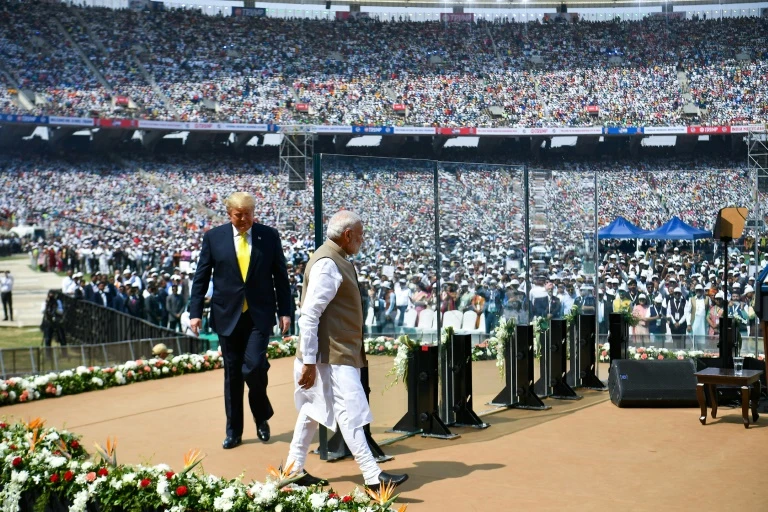Cricket is more than just a game in India: critics accuse ruling-party politicians and the sport's closely linked mega-rich board of exploiting its huge popularity for electoral advantage.
India begins voting in six-week-long general elections on Friday, with Prime Minister Narendra Modi's Hindu-nationalist Bharatiya Janata Party (BJP) widely expected to sweep to a third term in power.
Modi's BJP is intricately tied to the powerful Board of Control for Cricket in India (BCCI), with commentators saying the ruling party has sought to co-opt the sport as a tool to bowl out political opponents.
Veteran cricket journalist Sharda Ugra said the sport is "used as a vehicle for a muscular nationalism".
"Control is exercised not just through its presence of senior officials connected to the ruling party, but through the use of Indian cricket to further their political messaging," she told AFP.
Modi's government is far from the first to use cricket for political gain in India, but his populist BJP has tightened those links further than any before, added Ugra.
BCCI chief Jay Shah is the son of home affairs minister Amit Shah, Modi's right-hand man and himself a former president of the Gujarat state cricket board.
Arun Dhumal, chairman of the money-spinning Indian Premier League, is the brother of sports minister Anurag Thakur, who is also an ex-BCCI head.
"The current BCCI is the first Indian cricketing administration which is under the control of a single political party, and not a general clutch of politicians," said Ugra.
Gideon Haigh, cricket writer for The Australian newspaper, has called the BJP "shameless in its self-interest" for co-opting the sport.
"Cricket is just one of many institutions it has captured, although it is the one most meaningful to the most people," Haigh told AFP.
- Stadiums renamed -
The BJP won state elections in Rajasthan in December, and last month a minister's son took charge of the cricket board.
In New Delhi, the capital's stadium was renamed in 2019 after a BJP stalwart, the late finance minister Arun Jaitley, whose son Rohan Jaitley heads the state cricket board.
For the previous 137 years, it had been called the Feroz Shah Kotla stadium, after a 14th-century Muslim sultan.
And when India hosted the ODI World Cup last year, Modi attended the final at the world's biggest cricket stadium -- which is named after him -- in Ahmedabad.
A home victory would undoubtedly have further boosted national pride ahead of the election, but India lost in the decider.
Modi went into the dressing room, accompanied by a camera crew, to embrace the Indian team. "It happens," he told them. "Keep smiling, the country is looking up to you."
India's delays or denials of visas for the tournament for players and fans from arch-rival Pakistan had raised some concerns.
Other players with Pakistani heritage -- including Australia's Usman Khawaja and England's Shoaib Bashir -- have also faced visa challenges during India tours.
The BCCI did not respond to a series of questions submitted by AFP.
- 'Looked the other way' -
Cricket is a lucrative business in the world's most populous nation, home to 1.4 billion people.
By some counts, Indian cricket on average generates more revenue than Bollywood.
The IPL is the world's richest cricket league and has added to the BCCI's wealth, with the board selling the 2023-27 T20 tournament's broadcast and digital rights for $6.2 billion.
Commentators say the BCCI's wealth and reach enables it to pull strings at cricket's world governing body, the International Cricket Council (ICC).
More than 90 percent of the sport's billion-plus worldwide fans are in the Indian subcontinent, according to a 2018 ICC study.
In other countries, the ICC has been swift to suspend boards over political interference, including in Zimbabwe in 2019 and Sri Lanka last year.
ICC rules say cricket boards must manage their affairs "autonomously" and "ensure that there is no government (or other public or quasi-public body) interference in its governance".
The ICC declined to comment on India's role.
Modi opened his eponymous 132,000-seater ground in Ahmedabad in 2020 in a mega-rally for then-US president Donald Trump.
Haigh covered the 2023 India-Australia series and recalled how Modi toured the venue in a golf cart alongside his Australian counterpart Anthony Albanese when it hosted the fourth Test.
BJP members, government officials and school children were bussed in for the event, cheering as Modi lapped the venue.
The stadium rapidly emptied after the leaders left, even as play began.
"That the ICC -- which purports to deplore political interference in cricket -- studiously looked the other way, tells you all you need to know about its capture by the BCCI," Haigh said.


